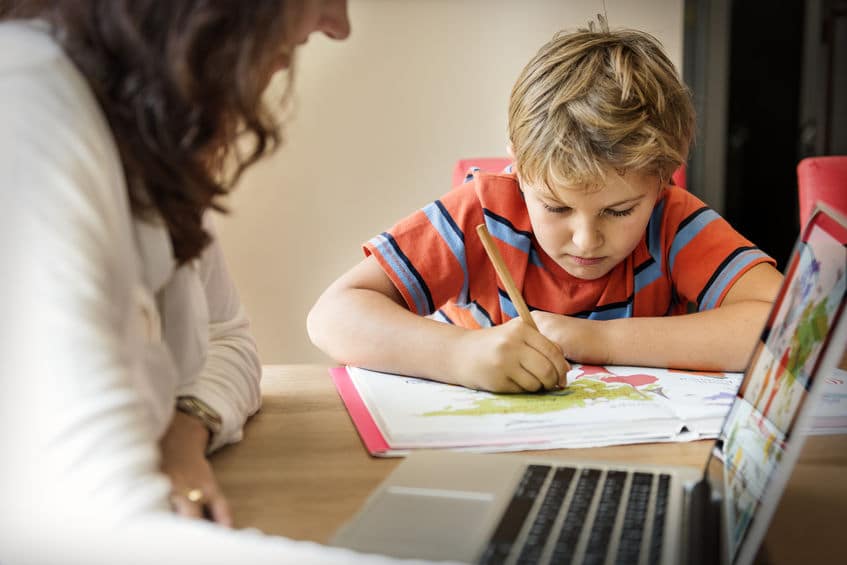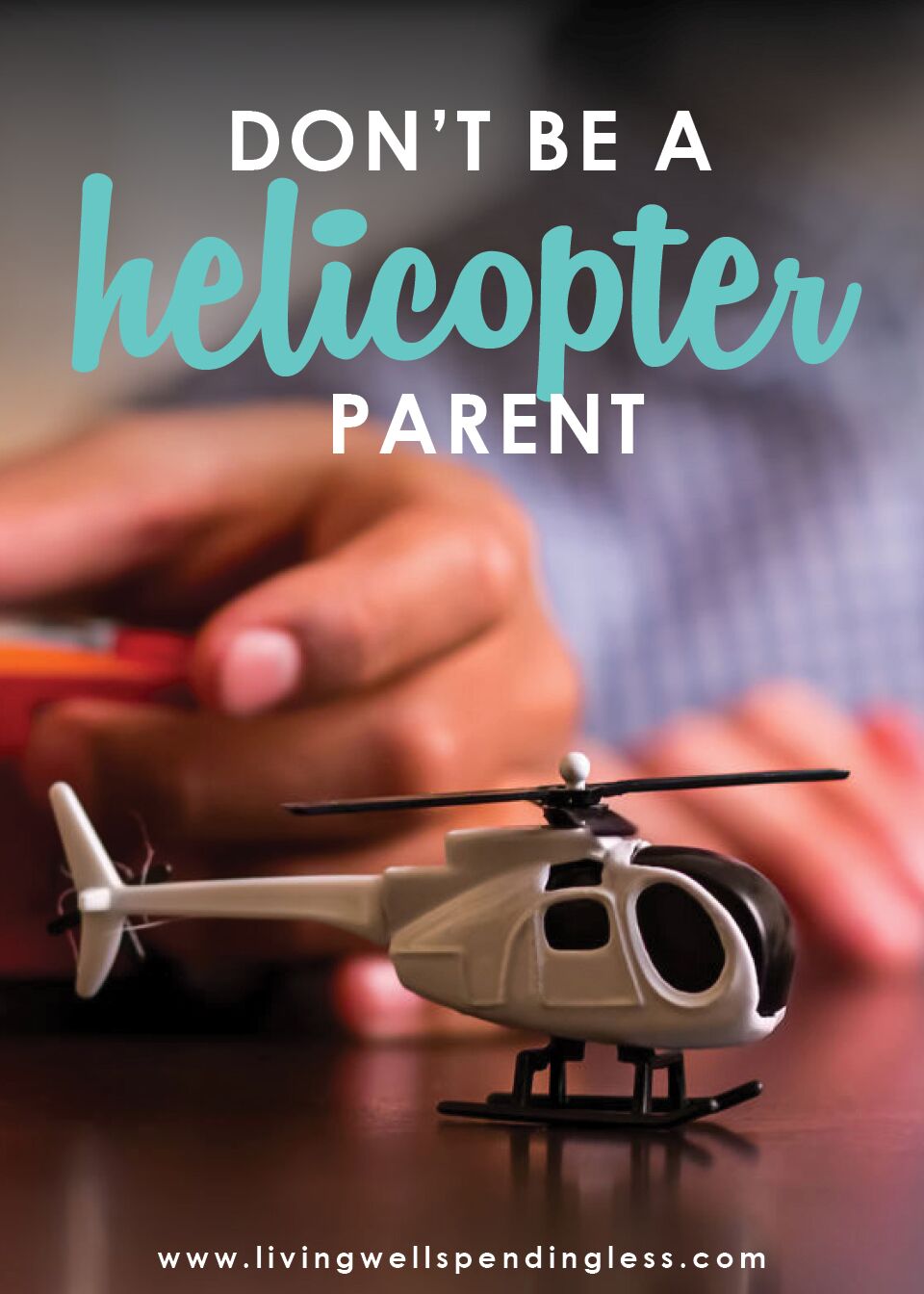Don’t Be a Helicopter Parent (and Other Mistakes to Avoid)
Not long ago, I returned home from a work trip to two very happy girls who hadn’t missed me one bit. You see, even though my husband is a stay-at-home-dad and their primary caregiver, our daughters always enjoy their special weekends with daddy, because they do all sorts of things that I never let them do, like sleep in their clothes and camp in the backyard and eat out at the Golden Corral.
Yep, they’ve got him wrapped around their little fingers.
But the truth is that, even when it bruises my ego just a little, I’m super grateful to have a husband that balances the parenting workload (usually taking on even MORE than his half) and kids that don’t really miss me that much when I’m away, because I know that raising kids that are self-sufficient and adaptable is probably one of the best things that we can do.
After all, studies show self-sufficient kids become self-sufficient adults. They have greater confidence. They show increased problem-solving and coping skills. They develop grit.
But let’s face it–parenting is one of the toughest jobs out there. No matter what we do, we wonder if we’re doing it right—are we hovering too close? Are we encouraging good behavior? Are we raising our kids to be independent, but still protecting them enough?
So while not one of us is perfect, it’s always good to do a check-in now and again. Are we falling into some of these common parenting pitfalls? And if so, what can we do to correct ourselves, improve our parenting style and raise strong, independent, confident kids?
[socialpug_tweet tweet=”Self-sufficient kids become self-sufficient adults.” display_tweet=”Self-sufficient kids become self-sufficient adults.”]
Question 1: Do You Hover Around Your Kids?
Are you guilty of “helicopter parenting”? Of course, we all want to keep a close eye on our kids. In this day and age, it’s a natural, protective instinct to watch your kids when you’re at the store, at the park or when they’re simply playing.
Solution: Give Your Child Space
It’s hard to let those “mom worries” go. We would all feel terrible if our kids got hurt or faced danger. We’ve heard enough horror stories and seen enough Lifetime movies to know fears are very real and founded. Yet, hovering too close doesn’t foster independence and learning.
Turns out, kids need to learn to navigate the world without our help. There will come a day when our kids are faced with choices or situations, where we’re not there to guide them. Stepping back allows our kids to build these vital coping and logic skills. It helps them learn how to navigate different situations that come their way. So the next time you want to stay close by, take a step back, keep a watchful eye, but suppress the urge to swoop in and “fix.”
Question 2: Do You Turn to Your Kid When You’re Upset?
How many of us are guilty of relying on our kids as our sounding boards and emotional support? We all do it from time to time. Emotional connections are part of the mother-child bond. Yet, as the parent, we are responsible for refraining from weighing down our kids with our adult problems.
Solution: Don’t Rely on Your Child as Your Emotional Support
If you have a particularly mature child, it’s tough to remember you aren’t only their “friend” but you’re also their parent. Kids are capable of very adult conversations and understanding BIG topics, but there are also times when they’re lacking the emotional maturity to fully understand and cope with certain situations.
When you discuss finances, politics and other topics with your child, scale it to their level and understanding. Answer questions openly and honestly, but don’t rely on your child to guide you or provide you with emotional assistance.

Question 3: Is Your News feed Filled with Pictures of Your Kids?
As moms, it’s tempting to share every milestone and exciting activity your child does on social media. While this is great (and you SHOULD certainly feel proud of you kid’s accomplishments!), it’s also important you enjoy your own interests as well. Many of us find profound fulfillment in motherhood, yet, in 18 years, when our kids go to college, we may be left with a sense of loss and loneliness.
Solution: Explore Interests Outside of Being a Mom
Therefore, it’s important to cultivate our own interests. It’s also important for the wellbeing of our kids, so we don’t live vicariously through them. We’ve all cringed at those “stage mom” TV shows, where mothers push their kids into the spotlight, molding them into ideal. Kids need their own interests and their own time to be kids.
It’s easy to get wrapped up in cheering your kids on at sporting events or urging them to take ballet, swimming and other lessons you missed out on as a kid. We want our kids to achieve and have all we didn’t. We put our hopes and dreams into our child, but it’s important we still focus on activities we enjoy on our own. Not only will it help you become a well-rounded individual, but also it will lessen the pressure on your kids to live up to extreme expectations.
Question 4: When You’re in a Bad Mood, Does Everyone Know About It?
We’ve all heard the saying, “When Mamma ain’t happy, ain’t nobody happy.” It’s true, when we’re in a bad mood or frustrated, it’s tough not to let our stress spill over into our kids. When this happens we experience a “trickle down” effect. Yet, we may wonder why everyone else is crabby and cranky too.
Solution: Remind Yourself: Mom Sets the Tone
When it comes to the mood of the day, mom sets the tone. It’s up to you to foster a positive atmosphere (even when it’s so hard)! It’s up to us as parents to be examples of a can-do attitude and an ability to deal with whatever life throws our way. Fortunately, that also means it’s possible to flip the mood too when things are going awry.
Now, it’s not reasonable to expect we’re never going to experience a bad day or feel annoyed. The important part is we don’t pass our irritation on if we can help it. Don’t hesitate to take a break or give yourself a little “cooling off” time so you can reset and approach the situation with a calm, understanding attitude. Lead by example.
Question 5: Do You “Label” Your Child?
When we say our kid is a “handful” or our kid is “cranky,” we’re setting them up to “be” a certain way, rather than simply viewing it as a temporary state or feeling. Labeling kids breeds expectations and creates boxes rather than giving kids the freedom to change and grow.
[socialpug_tweet tweet=”Labeling kids breeds expectations and creates boxes rather than giving kids the freedom to change and grow.” display_tweet=”Labeling kids breeds expectations and creates boxes rather than giving kids the freedom to change and grow.”]
Solution: Don’t Dwell on Shortcomings and Avoid Boxes
Many of us may have a child who’s more challenging than their siblings or even a child who stands out from their siblings with certain abilities. It’s important to allow our kids the space to forge their own identities and discover who they are. They need to explore their natural abilities and aptitudes.
If your kid is struggling with behavior, learning or another problem, remember to also respect your child’s privacy. It’s important not to address your concerns about your kids in front of them or talk about them as though they’re unaware of criticism. Kids may take what you say to heart, even if you’re venting to a friend, and it can impact their self-esteem and self-image.

Question 6: When Your Kid Has a Problem, Do You Jump in to Fix It?
To help your kids build coping skills you must let them experience dilemmas and opportunities to make mistakes. It’s tough. We all want to shield our kids from pain, and mistakes are simply that—painful and stressful. It’s hard to resist your mom instinct to sweep in and resolve the issue for them.
Solution: Remind Yourself that Problems Encourage Grit
Grit is the ability to cope with problems and setbacks. It’s a vital life skill, helping kids become strong, independent adults. Kids with grit are good at logic. They don’t become overwhelmed by situations because they’re able to discover alternate solutions and workarounds.
When we hold back and let kids figure stuff out on their own, they gain confidence. They also build coping skills and the ability to think creatively. Kids who are faced with conundrums build problem solving skills and become innovators. Before you rush in to help your child, allow them to struggle a little and see what solutions they come up with on their own.
Question 7: Do You Encourage Your Kid to Always Go with the Flow?
We also want our kids to behave politely, with kindness and to learn to play by the rules. At the same time, one of my own personal mantras is, “Rules are for suckers.” Not to say your kids should become lawbreaking mini-rebels, but it’s okay for kids to question authority and advocate for themselves. It’s also good for them to resolve conflicts with teachers, friends and even bullies without our help or intervention.
Solution: Teach Your Kid to Stand Up for Themselves
Too often kids lose their confidence as they grow up, because we urge them to always take the polite route or we rush in to fight their battles. We tell them not to rock the boat or get confrontational. We teach them to comply and go with the crowd.
Yet, we all want kids who are tough enough to really hold their beliefs when it counts, right? We want our children to become leaders who will stay strong when faced with moral dilemmas and situations they know aren’t right. We want them to advocate for their needs. That means, teaching them it’s okay to question, express dislike and even argue. As long as they’re expressing their frustration in a healthy, respectful manner, it’s perfectly fine and even positive. Urge your kids to stand strong.
Question 8: When Your Kids Want Something, Do They Get It?
When your kids want an item at the store, a special activity or another privilege, how much whining happens before you cave in? Every time my kids work to earn something they want, without fail, they appreciate it more. When they’re given an item, I might find it on the floor, tossed aside or in the bottom of a drawer. When they work to earn something, they value and treasure it. When they were younger, we went through a huge overhaul, where I cleaned out their rooms and threw out all of their toys (yes, I know, it sounds crazy, but I was seriously fed up).
Solution: Teach Your Kids to Earn Privileges
My kids have learned if they want something, they need to work to earn it. Now, of course I don’t force them to them clean the house from top to bottom. The jobs they do are in their wheelhouse and fit to their ability level.
What I discovered, when my kids learned that toys and fun were a privilege to be earned (not something to be demanded) was a total shift in appreciation and care. Suddenly my two daughters who had previously begged for a toy every time we went to the store, stopped. There were no more temper tantrums or whining. When they had items, they picked them up. They valued what they had. After this lesson, I decided we would earn “wants” in our family. I promise, it was one of the greatest shifts we went through and none of us ever looked back.

Question 9: Do You Feel Hurt When Your Kids Rebel?
When we’re in overprotective parent mode, we may fret if our kids don’t follow our instructions. We may worry if they display less-than-desirable behaviors. We may imagine a perfect, happy family all the time and worry ours doesn’t measure up. We may even take it personally and question our parenting skills. It’s hard not to feel offended when you’re ignored or receive a sassy comment.
Solution: Stay Strong and Don’t Feel Offended if Your Child Doesn’t Always Obey
Your kids aren’t going to obey every request. They’re probably not going to agree with everything you say or do (especially when they hit the pre-teen stage—look out!). Accept it’s perfectly okay. A little rebellion is normal and yes, even healthy.
Let it go. No kids are perfectly behaved all the time. In fact, most kids are perfectly behaved almost NONE of the time. It’s normal. You aren’t failing as a parent if your kids go through a tough phase, decide they don’t like you (or their siblings) today or even need space. Simply hold fast to keeping your family rules in place. Teach your kids to trust in the boundaries and parameters they’re given. Yes, this means actions have consequences.
Question 10: Do You Feel Guilty Giving Your Kids Chores?
Whether you grew up with too many chores, or never had to help out, chances are your own childhood probably comes into play when you consider your kids and the dreaded chore-chart. But, in life we all make messes. We have to learn that cleaning and organizing is simply part of living.
Solution: Don’t Be Afraid To Put Your Kids to Work
Independent kids learn how to work and help out around the house. Yes, sometimes it’s so they earn privileges but sometimes it’s because they’re part of a family and that means helping out. Often, I hear from friends with young adult kids, their sons and daughters struggle with life skills when they move out of the house. They don’t know how to clean up after themselves. They don’t understand finances. They expect the laundry to do itself.
When you teach your kids how to do the dishes, make a bed or put money into savings, you’re teaching them skills to carry them forward for the rest of their lives. You’re teaching them to have a work ethic and to learn the value of labor. These are important lessons! While your kids don’t need to become mini Cinderellas, it doesn’t hurt kids to learn to do house and yardwork. In fact, they’ll be better off because of it in the long run.
Independent kids learn to become successful adults. They have life skills to carry them through their time at college, in their first apartment, relationships and jobs. These leadership skills are perhaps one of the most valuable traits we can bestow on our kids.
The next time you feel the urge to swoop in and “fix” or “help” your kids in a situation, take a pause and wait it out. You and your child may both discover something new from the experience.






My daughter is 3 now and for about a year my husband and I realized that she understood a lot more than she could verbalize. We decided then that we wanted to stop talking about her as if she did not understand because she was clearly showing us signs that she knew. Recognizing that our children are tiny little humans on their own merit is important. One of the scariest, and yet, rewarding lesson that I learned since becoming a mother is that although our job is to guide them, they are their own person and we should honor that.
great advice!
I can relate to this so much! My husband is the stay at home parent for our two kids also. This is great advice. One more thing that I struggle with for my family is making sure I am encouraging my kids to be who they really are, and not just who I want them to be. Thanks for another great post!
Thanks for this insight Ruth! I’m currently pregnant with my third son, and navigating boys has been eye opening for me. They do everything differently, and learning to let boys be boys while still maintaining a level of dignity, respect, and independence is always difficult. I love how all of your tips build up instead of breaking down their spirits. I think too often parents use strict obedience as a means of control, and as such, inadvertently strip their children of the confidence that you are rightly working to build in your children.
This is all great advice. I try so hard to avoid doing all of these things and I think undoing a pretty good job. But my son is only three. I know as he gets older a lot of it is going to get more difficult. Here’s to the grit to keep going on the way we know we should and avoiding those impulses to helicopter!
I appreciate your thoughts. I’ve naturally been on the end of the spectrum to let my son figure things out on his own by doing. “Touching the hot stove” I started chores appropriate for his age and started discipline to earn things, etc. It slowly fizzled away because I was overpowered by my helicopter husband and family members. Without consistency it’s hard to keep up w a certain direction of rearing. It’s so refreshing to know I’m not the only one out there that believes in this!
We all were born to be real, but not to be perfect. And as parents we’re falling into some common parenting pitfalls. To be a parent means to learn how to improve our parenting style now and again to cultivate our children into open-minded and self-sufficient individuals capable of planning for our future and taking right decisions from childhood – from writing a law dissertation proposal example to career choice. Hence, as we are the parents, it is our responsibility to raise our kids to be strong, independent, and confident, but still protect them enough.
As a Mom viewing parenting in the rear view window, I can say that your advice is spot on. I was never perfect, nobody nails it every single day, but I tried. The one point that most resonates with me, as a parent, is acceptance.
I did allow my children,all four of them, to be independent thinkers. I never expected perfection, but I did want them to be well adjusted, productive members of society. I always kick myself when I see a struggle with mental illness and drug use. I carry guilt as heavy as a cement block, even though realistically I know I was a good parent.
This is great advice. One more thing that I struggle with for my family is making sure I am encouraging my kids to be who they really are, and not just who I want them to be.